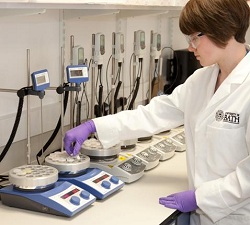A CUSTOM Asynt dry heating block is currently in use at the Wilson structural chemistry research group at the University of Bath, UK, is a project to simplify and accelerate crystallisation method development.
The researchers are selectively controlling polymorph formation, generating multi-component crystals with specific optical properties, solubility, and porosity.
The control of crystalline forms is desirable in many industries, including pharmaceuticals and agrichemicals, where different polymorphs are known to affect physical properties of active ingredients. Many factors are known to affect crystal formation, including solvents, temperature, and any additives present.
Research fellow Lynne Thomas observes: “Temperature fluctuations in particular are known to induce crystallisation and can act as a switch controlling which crystalline form is obtained. Careful temperature control is therefore of critical importance, and the number of potential temperature and solvent combinations makes screening through a parallel approach essential”.
The adapted DrySyn heating block enables precise control of 19 crystallisations in parallel, and has says Dr Thomas proven its ability to increase the flexibility and speed of the group’s low- to medium-throughput crystallisation experiments.

